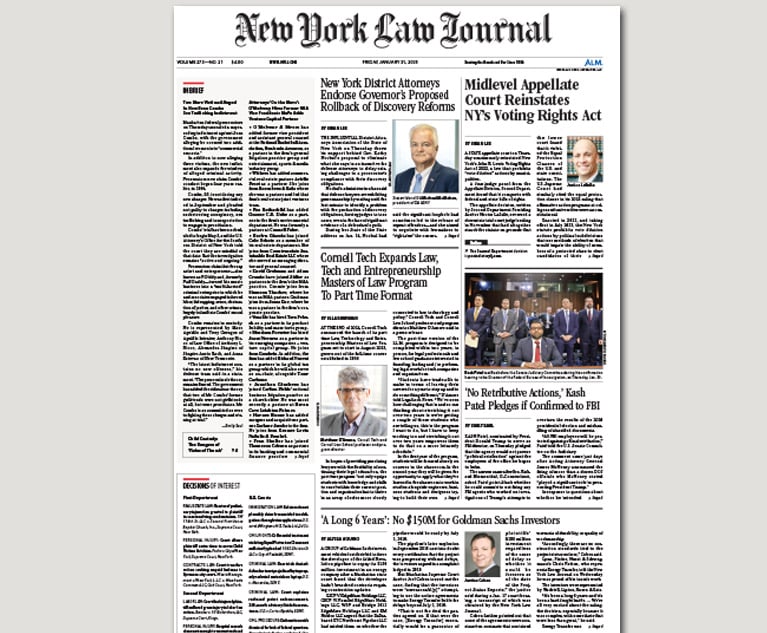Eviction, Class Action Award Solutions Win Global Legal Hackathons in NY, Philadelphia
The Global Legal Hackathon named a slew of first-round winners, including a Philadelphia team looking to aid evictees through the legal process and a New York duo that seeks to inform consumers of reimbursements from class action suits.
February 28, 2019 at 09:30 AM
4 minute read
The original version of this story was published on Legal Tech News

The second annual Global Legal Hackathon has begun, and winners from 24 countries have advanced to the second round, including two New York- and Philadelphia-based teams who looked to empower people to pursue civil court matters.
Participants in the first round of Global Legal Hackathon, which happened in a host of global cities, created legal solutions over two days beginning on Feb. 22. The solutions had to address access-to-justice or practice-of-law challenges.
One team was selected from each city to compete in a second round, in which they must submit a video of their updated solution by March 15. Finalists are scheduled to be announced March 25.
From there, finalists head to the third and final round to have their solution judged in person. Last year, the winners were four teams that were evenly split between solutions that assist the private or public sector.
While winners of the hackathon are not offered physical or monetary prizes, they do gain exposure and networking opportunities in the legal tech industry, said Pierson Grider, an organizer of Global Legal Hackathon.
This year, Grider said, the solutions pitched during the global event varied, but he noted that is to be expected. “I really think it depends on the jurisdiction and what pain points they were trying to solve.”
Big Apple's 'Classify' Legal Aid
In New York City, Shivam Satyarthi and Bliss Hu brainstormed and developed ”Classify,” a tool that aims to scan users' retail or bank purchases and inform them if they've purchased a product entitled to reimbursements from a class action. Classify advanced to the second round of the Global Legal Hackathon.
In screenshots shown to Legaltech News, users log into their Amazon account, and the Classify software scans their order history. A screen lists purchased items that were part of a class action and the estimated compensation they could receive. Users would fill out a claim form on Classify, and it would be sent to a law firm processing the class action.
Satyarthi said he and Hu, a Rutgers University computer science major, thought of the idea during the Global Legal Hackathon after kicking around a few ideas.
“We saw the problem that a lot of people don't know that the items they've bought [were part of] class actions,” said Satyarthi, a technology analyst for a Wall Street bank. “The affected parties most often don't even know they are eligible for compensation.”
Satyarthi said the judging panel of legal and technology professionals during the first round thought the solution provided a valuable service, but asked them to figure out how much class action money is unclaimed.
Ideally, the creators would also like to connect their solution to the purchasing history of online retailers and banks. However, at this stage, broad access to bank and retail data isn't available, Satyarthi acknowledged. Presently, they are using their personal bank cards to test their technology.
Philadelphia's 'Eviction Safe Philly' Guide
In Philadelphia, a team of lawyers and nonlawyers created “Eviction Safe Philly,” a web-based interactive form for those facing evictions in Philadelphia. The guide seeks to connect users fighting an eviction notice with legal aid offices specialized to their needs.
The form's recommendations adapt to a user's answers, and while it doesn't provide legal advice, it does create a standardized intake document that can quickly provide useful information to lawyers. “It's not fancy technology but it solves a real problem,” said team member and Morgan, Lewis & Bockius assistant director of information governance Johan Widjaja.
Widjaja added that the guide also adds any Philadelphia Department of Licenses and Inspections violations associated with a user's residence into the document. Highlighting such violations can be beneficial when contesting an eviction, Widjaja added.
Insiyah Jamal, a business analyst for Morgan Lewis and an “Eviction Safe Philly” team member, said the Hackathon judge panel questioned how the team expected to assist people who don't have access to the internet.
In response, Jamal said the team would explore making the guide accessible on kiosks in government buildings. The judges also recommended the team further explain to users how the data is being used.
Along with the panel's suggestions, the next update is set to include making the solution mobile friendly, becoming Americans with Disabilities Act compliant and adding timetables regarding the expected length of court proceedings.
This content has been archived. It is available through our partners, LexisNexis® and Bloomberg Law.
To view this content, please continue to their sites.
Not a Lexis Subscriber?
Subscribe Now
Not a Bloomberg Law Subscriber?
Subscribe Now
NOT FOR REPRINT
© 2025 ALM Global, LLC, All Rights Reserved. Request academic re-use from www.copyright.com. All other uses, submit a request to [email protected]. For more information visit Asset & Logo Licensing.
You Might Like
View All
Law Firms Expand Scope of Immigration Expertise Amid Blitz of Trump Orders
6 minute read

Orrick Hires Longtime Weil Partner as New Head of Antitrust Litigation
Trending Stories
- 128 Firms Supporting Retired Barnes & Thornburg Litigator in Georgia Supreme Court Malpractice Case
- 2Boosting Litigation and Employee Benefits Practices, Two Am Law 100 Firms Grow in Pittsburgh
- 3EMT Qualifies as 'Health Care Provider' Under Whistleblower Act, State Appellate Court Rules
- 4Bar Report - Feb. 3
- 5Was $1.3M in 'Incentive' Payments Commission? NJ Justices Weigh Arguments
Who Got The Work
J. Brugh Lower of Gibbons has entered an appearance for industrial equipment supplier Devco Corporation in a pending trademark infringement lawsuit. The suit, accusing the defendant of selling knock-off Graco products, was filed Dec. 18 in New Jersey District Court by Rivkin Radler on behalf of Graco Inc. and Graco Minnesota. The case, assigned to U.S. District Judge Zahid N. Quraishi, is 3:24-cv-11294, Graco Inc. et al v. Devco Corporation.
Who Got The Work
Rebecca Maller-Stein and Kent A. Yalowitz of Arnold & Porter Kaye Scholer have entered their appearances for Hanaco Venture Capital and its executives, Lior Prosor and David Frankel, in a pending securities lawsuit. The action, filed on Dec. 24 in New York Southern District Court by Zell, Aron & Co. on behalf of Goldeneye Advisors, accuses the defendants of negligently and fraudulently managing the plaintiff's $1 million investment. The case, assigned to U.S. District Judge Vernon S. Broderick, is 1:24-cv-09918, Goldeneye Advisors, LLC v. Hanaco Venture Capital, Ltd. et al.
Who Got The Work
Attorneys from A&O Shearman has stepped in as defense counsel for Toronto-Dominion Bank and other defendants in a pending securities class action. The suit, filed Dec. 11 in New York Southern District Court by Bleichmar Fonti & Auld, accuses the defendants of concealing the bank's 'pervasive' deficiencies in regards to its compliance with the Bank Secrecy Act and the quality of its anti-money laundering controls. The case, assigned to U.S. District Judge Arun Subramanian, is 1:24-cv-09445, Gonzalez v. The Toronto-Dominion Bank et al.
Who Got The Work
Crown Castle International, a Pennsylvania company providing shared communications infrastructure, has turned to Luke D. Wolf of Gordon Rees Scully Mansukhani to fend off a pending breach-of-contract lawsuit. The court action, filed Nov. 25 in Michigan Eastern District Court by Hooper Hathaway PC on behalf of The Town Residences LLC, accuses Crown Castle of failing to transfer approximately $30,000 in utility payments from T-Mobile in breach of a roof-top lease and assignment agreement. The case, assigned to U.S. District Judge Susan K. Declercq, is 2:24-cv-13131, The Town Residences LLC v. T-Mobile US, Inc. et al.
Who Got The Work
Wilfred P. Coronato and Daniel M. Schwartz of McCarter & English have stepped in as defense counsel to Electrolux Home Products Inc. in a pending product liability lawsuit. The court action, filed Nov. 26 in New York Eastern District Court by Poulos Lopiccolo PC and Nagel Rice LLP on behalf of David Stern, alleges that the defendant's refrigerators’ drawers and shelving repeatedly break and fall apart within months after purchase. The case, assigned to U.S. District Judge Joan M. Azrack, is 2:24-cv-08204, Stern v. Electrolux Home Products, Inc.
Featured Firms
Law Offices of Gary Martin Hays & Associates, P.C.
(470) 294-1674
Law Offices of Mark E. Salomone
(857) 444-6468
Smith & Hassler
(713) 739-1250







